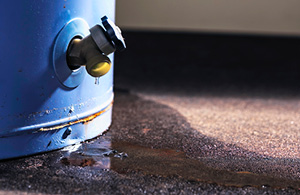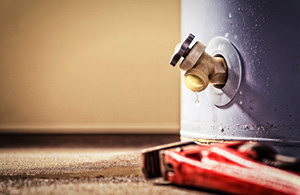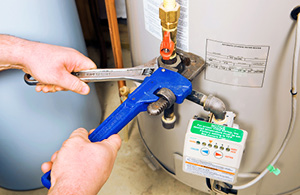- My Account:
- Sign In
- Register
- Make Payment
Articles.
Below are the categories for any articles that are published on our website. You can find articles on topics ranging from heating oil, propane, heating equipment, cooling, and much, much more. Our Home section also contains important tips, insightful facts and helpful how-to guides on lots of topics about everything from energy efficiency to important safety tips for taking care of your home and family. We also update our Featured Articles section with our newest and most relevant seasonal content to help you with your home services throughout the year. Check them out below...
Featured articles.
Why is my water heater leaking and how can it be fixed?

A leaking water heater can cause significant issues, impacting not only your access to hot water but also potentially causing damage to your home. When a water heater malfunctions, you may experience lukewarm or cold water, inconsistent water flow, or low water pressure. However, the most pressing concern is the potential for leaks, which can lead to extensive water damage, energy inefficiency, and even safety hazards. It’s crucial to address any signs of a leaking water heater promptly to prevent further complications.
All-in-all, it's a major inconvenience that needs to be resolved right away. One of the major indicators of a water heater issue is a puddle surrounding the water heater. But what causes a water heater to leak?
Identifying a water heater leak.
Signs of a water heater leaking can be subtle, from a few drips to an entire puddle around your unit. If there's a trickle of water, trace it back to its source.
If the water surrounding the unit is minimal, or barely noticeable, you'll need to investigate. While it's not uncommon for water heaters to leak, other water sources could have played a factor.
Come back to the water heater every few hours. If the water has evaporated and the area around the heater seems dry, the water may have come from another source. However, if there continues to be a small amount of water pooling around the heater, you likely have a leak.
What causes hot water heater leaks?

There are many reasons why a water heater may be leaking. It is important to remember to always consult a professional when investigating potential repairs for a leaking water heater.
A leaky valve.
The first step when your hot water heater is leaking is to check the drain valve at the base of the water heater. This is a small valve that should resemble an outdoor valve, one you would attach a garden hose to.
Check to see if the valve is loose. If it is, the home service professional assisting you will tighten it, and check after some time to see if it starts leaking again. If there's no water leakage, it's possible the valve was bumped sometime in the previous days, loosening it.
High-pressured tank.
The next factor to consider is the pressure of your water tank. Too much pressure can cause damage to the unit, leading to leaking.
There are a few ways to check the pressure on a water heater. A water heater is meant to store pressure and usually will regulate around 150-pounds per square inch. Your tank should have a relief valve, made of brass or bronze, with a small test lever attached.
Typically, a CPVC drain line will be attached to the valve. A professional will feel along the relief valve drain line. It should feel cool except at the connection point with the valve, where it will be hot. If the drain line is also hot, the relief valve is open and needs replacement immediately.
Next, the technician will lift the test lever on the pressure relief valve. A small amount of water and steam should be released. If the lever cannot be lifted, or the valve doesn't release water or steam, then the valve needs to be replaced.
Age of the water heater.
Finally, note the age of your water heater, as it is a major contributor to unit failure and leakage. The older a unit is, the more likely it will need full-on repairs or potentially replacing.
On average, hot water heaters last from 8-13 years. Well-maintained water heaters can last longer, potentially doubling that lifespan. Water heaters often have their ages included in them, but not always in the same place. It is important to keep the age of your water heater in mind and decide when would be a good time to replace your water heater.
What do water heater leaks from top, bottom or side mean?

The location of the leak, whether from the top, bottom, or side of the unit, can indicate specific issues.
Leaks from the Top
Leaks from the top of the water heater are often due to issues with the cold water inlet valve or the hot water outlet. These leaks are usually repairable and less severe than leaks from the bottom. However, if ignored, they can lead to more serious problems and expensive damage.
Leaks from the bottom.
Leaks from the bottom of the water heater can be minor or require a replacement. They are usually caused by issues with the drain valve or the tank itself.
The drain valve is used to empty the water tank during maintenance. If it becomes loose or corroded, it can allow water to flow through it, causing a leak. If the drain valve is the issue, it may need to be tightened or replaced.
If the tank itself is leaking, it usually means the unit needs to be replaced. This can happen due to age, corrosion, or sediment build-up at the bottom of the tank
Leaks from the side.
Leaks from the side of the water heater are typically due to issues with the temperature pressure relief valve. This valve is a safety mechanism that allows hot water and steam to discharge from the tank if the pressure or temperature inside becomes too high
If you notice a leak from this valve, first check the temperature setting on your water heater. If it's set correctly and the leak continues, the valve is likely defective and needs to be replaced.
What to do if your water heater is leaking.
A leak of a single drip can cost $35 a year and will waste nearly 1,660 gallons of water. If you have a leak that drips once per second, you'll waste 8.64 gallons of water per day, over 3,150 gallons of water per year.
- Check if the water heater is under warranty: If your water heater is relatively new, it may still be under warranty. You can verify this by calling the service number located on the unit. The manufacturer may provide free repair or replacement if it is under warranty.
- Identify the source of the leak: Try to identify where the leak is coming from. If the drain valve is leaking, you'll likely need to drain the tank and replace the valve.
- Contact a professional: If the drain valve is the source of the leak, it's recommended to contact a professional for this fix. Replacing a drain valve involves draining the tank, which can be a complex and potentially hazardous task if not done correctly.
- Shut off the water heater: If the leak is severe, you should shut off the water heater entirely to prevent further damage. This involves turning off the power supply for electric heaters or the gas supply for gas heaters and then shutting off the water supply.
- Seek immediate professional assistance: If the leak is severe, it's crucial to contact a professional immediately for assistance. They can assess the situation, identify the cause of the leak, and recommend the best course of action to fix the problem.
Remember, dealing with a leaking water heater can be complex and potentially dangerous if not handled correctly. Always prioritize safety and don't hesitate to seek professional help when needed.
Where to go for water heater repairs and services?
If your water heater is leaking, then leave it to the professionals at Petro Home Services for repairs. We're equipped for repairing water heaters both big and small. Petro services communities throughout the Mid-Atlantic and Northeast. Our team of experts is ready to help you 24/7, to help get your home back in working order.
If you have additional questions, contact Petro for sales at 888.735.5651 and services at 800.645.4328. We perform water heater repairs, water heater services, and replace and reinstall new water heaters.






